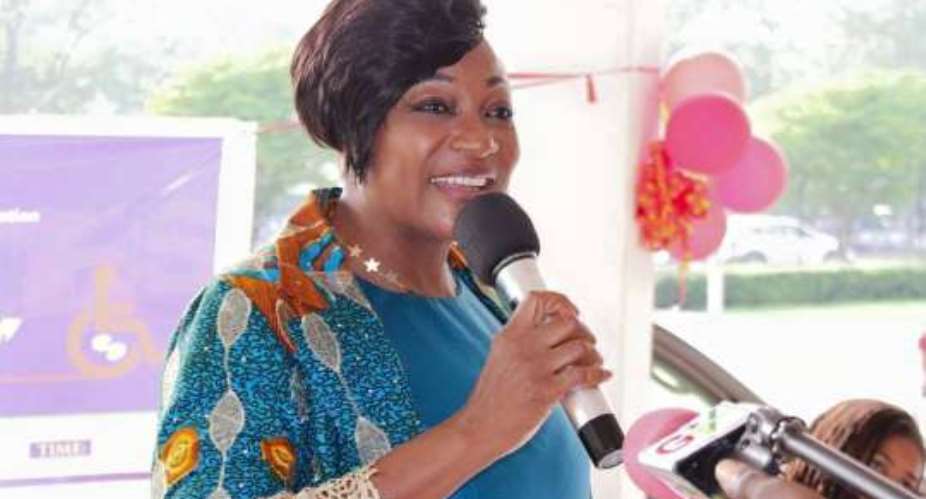Accra, May 24, GNA - A preventive and management plan to reduce Obstetric Fistula (OF) to 50 per cent by 2021 was launched on Tuesday to commemorate the World Fistula Day.
The Plan, a collaborative effort from the Ghana Health Service, the Ministry of Gender, Children and Social protection, the United Nations Population Fund (UNFPA) and other stakeholders is to mobilize resources to address OF affecting Ghanaian women.
Speaking at the event, Madam Otiko Afisa Djabah, the Minister for Gender, Children and Social Protection beseeched stakeholders and the public to join hands and fight the disease in order to restore the dignity of the Ghanaian woman.
She also challenged traditional leaders especially women to fight against early marriage, which has been identified as one of the leading causes of Obstetric Fistula in the country and especially the Northern sector.
The Minister said that 'people should come together to fight the stigmatization that they face as a result of the disease since the disease is often acquired from childbirth and no fault of theirs'.
She said that though the disease was curable, many women were not able to get treatment due to lack of resources 'and that is an indicator of where Ghana is when it comes to issues concerning women'.
She said that her outfit has as a result enrolled treated Fistula Patients on the Leap Program to help them have economic power after their recovery.
Dr Sebastian Eliason, a Health consultant and a member of the Fistula Control Team, enlightened the guests on Obstetric Fistula and presented the plan to reduce it.
He explained that Obstetric Fistula is an injury of Childbearing caused by several hours of obstructed labour without timely intervention.
He observed that 90 per cent of the cases resulted in child mortality, while women ended up with chronic urinary or faecal incontinence or both and with a persistent and offensive smell.
Due to the stigma and ostracization victims face, the disease was recognised as a Human Right Violation by the WHO, he said.
He noted that World Health Organization estimated that globally about two million girls and women lived with Fistula, while in Ghana, 1538 patients were seen between January 2011 and July 2014, with the Northern Region recording the highest with 527 women, while the Upper East Region recorded the lowest with 25 women.
Dr Eliason observed that early marriage and gender discrimination, malnutrition, lack of access to emergency care, poor health services and poverty were the main causes of Obstetric Fistula.
He said the consequences of this were divorce, abandonment, ridicule and shame, physical and emotional isolation, lack of economic support and risk of violence and abuse.
He stated that efforts made to curb the disease had not been very successful due to low awareness and knowledge, misconception about Fistula, prolong or home labour, persistent teen marriages, poor distribution of skilled health personnel and the presence of young inexperienced doctors at health centres.
He said that to achieve the set goal by 2021, various roles and responsibilities that have been assigned to various stakeholders were to be acted upon as well as the necessary financial and material resources requirement for successful implementation.
Madam Erika Goldson, the acting representative of UNFPA, said that Fistula is a high priority for the UNFPA since was it is a key step to achieving the World's Sustainable Development Goal by 2030.
She said that the disease has been virtually eliminated in the world's wealthier countries hence it can be eliminated in Ghana.
She said her outfit partnered with other stakeholders to repair 600 fistula surgeries since 2005 and 99 cases in 2016 alone, but added that much more needed to be done because 700 to 1300 cases occur annually.
She stated that what Ghana needed was a strong health system and greater efforts to address the underlying issues such as poverty, gender inequality, early marriage and childbearing and other factors.
She said the UFPA had supported the Ghana Health Service to develop a national strategic plan to prevent and manage the disease.
She concluded that with a strong political leadership, investment and action ''we can end this scourge in our lifetime'.
GNA
By Christabel Addo /Agnes Ansah, GNA





 Saglemi Housing Project will not be left to rot – Kojo Oppong Nkrumah
Saglemi Housing Project will not be left to rot – Kojo Oppong Nkrumah
 Transport fares hike: GPRTU issue two-day ultimatum
Transport fares hike: GPRTU issue two-day ultimatum
 ARC endorses Alan as presidential candidate – Buaben Asamoa
ARC endorses Alan as presidential candidate – Buaben Asamoa
 Akufo-Addo appoints Kwasi Agyei as new Controller and Accountant-General
Akufo-Addo appoints Kwasi Agyei as new Controller and Accountant-General
 PNC dismiss reports of mass resignations
PNC dismiss reports of mass resignations
 PAC advocates for revenue collectors to be engaged on commission basis, not full...
PAC advocates for revenue collectors to be engaged on commission basis, not full...
 Genser Energy commissions 110km of natural gas pipeline at Anwomaso
Genser Energy commissions 110km of natural gas pipeline at Anwomaso
 Naa Torshie calls for tolerance, peace ahead of 2024 election
Naa Torshie calls for tolerance, peace ahead of 2024 election
 Asantehene commends Matthew Opoku Prempeh for conceiving GENSER Kumasi Pipeline ...
Asantehene commends Matthew Opoku Prempeh for conceiving GENSER Kumasi Pipeline ...
 Let’s do away with ‘slash and burn politics’ in Ghana — Dr Adutwum
Let’s do away with ‘slash and burn politics’ in Ghana — Dr Adutwum
